
Land
Scope & Guideline
Shaping Policies through Interdisciplinary Land Research
Introduction
Aims and Scopes
- Sustainable Land Management:
Research on practices and policies that promote sustainable land use, balancing ecological health with economic development. - Urban and Regional Planning:
Explores urbanization processes, spatial planning, and the impacts of land use on urban and rural development. - Ecosystem Services:
Investigates the provision and valuation of ecosystem services and their relationship with land use and management. - Climate Change Impacts:
Analyzes how climate change affects land use patterns, agricultural productivity, and ecosystem health. - Socioeconomic Factors in Land Use:
Examines the influence of social, economic, and political factors on land use decisions and outcomes. - Technological Innovations in Land Use:
Focuses on the application of remote sensing, GIS, and machine learning technologies in land use assessment and planning. - Cultural Landscape Management:
Studies the integration of cultural heritage and landscape management in the context of sustainable development.
Trending and Emerging
- Digital and Remote Sensing Technologies:
There is a growing focus on utilizing digital tools, remote sensing, and big data analytics to assess and manage land use and cover changes. - Climate Resilience and Adaptation Strategies:
Research is increasingly addressing how land use planning can enhance resilience to climate change impacts, integrating adaptive strategies into urban and rural planning. - Community-Based Land Management:
Emerging studies emphasize the importance of community participation and local knowledge in land management practices, reflecting a shift towards more inclusive governance models. - Sustainable Urbanization:
The journal is seeing a rise in research related to sustainable urban growth, exploring how to balance urban expansion with ecological sustainability. - Ecosystem Service Valuation:
There is a notable trend towards quantifying and valuing ecosystem services in land use planning, incorporating these assessments into decision-making processes. - Socioeconomic Equity in Land Use:
Emerging themes focus on addressing social equity in land use planning, highlighting disparities and seeking solutions for equitable access to land and resources.
Declining or Waning
- Traditional Agricultural Practices:
There is a noticeable decline in research dedicated to conventional agricultural practices, as contemporary studies increasingly emphasize sustainable and innovative farming techniques. - Single-Factor Land Use Studies:
Research that examines land use impacts in isolation from other environmental or social factors seems to be less prevalent, with a shift towards integrated approaches. - Land Use Conflicts in Isolated Contexts:
Studies focusing on land use conflicts without considering broader socioeconomic or environmental contexts are becoming less common, as interdisciplinary approaches gain traction. - Historical Land Use Analysis:
Research focusing solely on historical land use without linking it to current implications or future scenarios appears to be waning in favor of more dynamic, forward-looking studies. - Rural Land Use without Socioeconomic Context:
Research that does not incorporate the socioeconomic implications of rural land use decisions is declining, as there is a growing recognition of the interconnectedness of these factors.
Similar Journals
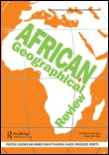
African Geographical Review
Championing Research that Shapes Africa's Geographic FutureAfrican Geographical Review is a pivotal academic journal published by Routledge Journals, Taylor & Francis Ltd, whose mission is to advance knowledge and understanding of geographical dynamics across the African continent. With an ISSN of 1937-6812 and an E-ISSN of 2163-2642, this journal consistently delivers high-quality research, showcasing innovative perspectives and interdisciplinary approaches within the fields of Earth-Surface Processes and Geography, Planning and Development. Recognized in 2023 with a Q2 ranking in these categories, it ranks #231 out of 821 in Social Sciences and #63 out of 179 in Earth and Planetary Sciences according to Scopus metrics, reflecting its substantial impact and relevance. Featuring research that spans various geographic themes, the journal not only champions academic inquiry but also fosters a deeper understanding of spatial and environmental challenges unique to Africa. Engaging with a diverse audience of researchers, professionals, and students, the African Geographical Review serves as an indispensable resource for those committed to enhancing geographic scholarship and informing sustainable development practices across the continent.

Geography and Sustainability
Advancing Knowledge for a Sustainable World.Geography and Sustainability is a prestigious, peer-reviewed journal published by Elsevier, focusing on the interdisciplinary fields of geography, ecology, and environmental science. As an Open Access publication since 2020, it aims to provide a platform for the dissemination of high-quality research that addresses critical sustainability challenges facing our planet. Based in China, the journal navigates through an impressive array of categories, all classified in the Q1 Quartile rankings for 2023, showcasing its top-tier status in areas such as Earth-Surface Processes, Geography, Planning and Development, and Nature and Landscape Conservation. With its notable impact factors—ranked 2nd in Earth and Planetary Sciences and 3rd in Environmental Science—it attracts contributions from leading experts and emerging scholars alike. Researchers, professionals, and students seeking to advance the scientific understanding of sustainability and its geographical implications will find indispensable resources and innovative findings within the pages of this journal.

Regional Environmental Change
Bridging Science and Policy for a Greener FutureRegional Environmental Change, published by SPRINGER HEIDELBERG, is a leading journal dedicated to the critical field of Environmental Science, specifically focusing on the global and planetary changes affecting our regional environments. Since its inception in 2005 and continuing through 2024, the journal has been a pivotal platform for disseminating cutting-edge research, insights, and methodologies that address pressing environmental issues. With an impressive Scopus rank, placing it in the top 30% of journals in its category, Regional Environmental Change (ISSN: 1436-3798; E-ISSN: 1436-378X) showcases high-quality academic articles that engage with the multifaceted impacts of environmental shifts, providing researchers, professionals, and students with vital knowledge and data. Although the journal does not currently offer Open Access, it remains a crucial resource for those committed to understanding and mitigating the effects of environmental change on regional ecosystems and communities.
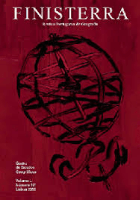
Finisterra-Revista Portuguesa de Geografia
Connecting Ideas Across Geographical DisciplinesFinisterra-Revista Portuguesa de Geografia is a distinguished academic journal published by the Centro de Estudos Geográficos, Universidade de Lisboa, since 1978, presenting a vital platform for research in the fields of Geography, Earth and Planetary Sciences. The journal operates under an Open Access model, encouraging broad dissemination of knowledge and ensuring that research is accessible to all, a commitment it has upheld since 2004. With a notable Q3 ranking in both Earth and Planetary Sciences (miscellaneous) and Geography, Planning and Development as of 2023, it serves as a significant conduit for scholarly discourse in these domains. The journal's scope reflects a diverse array of geographical studies, promoting interdisciplinary dialogue and research innovations, while its strategic publication history showcases its adaptability and relevance to contemporary issues. Researchers, professionals, and students alike are invited to engage with this pivotal resource that continues to shape geographical scholarship in Portugal and beyond.
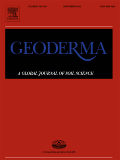
Geoderma
Innovating Soil Research for a Sustainable FutureGeoderma is a leading academic journal published by ELSEVIER, focused on the vital field of Soil Science. With an impressive impact factor and ranking as Q1 in its category for 2023, this journal stands as a prominent platform for researchers and professionals seeking to explore advanced scientific studies related to soil and its relationships with the ecosystem. Covering a wide range of topics from soil formation and characterization to land use and management practices, Geoderma is recognized for its rigorous peer-review process and is highly regarded within the global scientific community, as evidenced by its ranking of #12 out of 159 in the Scopus categories of Agricultural and Biological Sciences and Soil Science, placing it in the top 92nd percentile. With its inception dating back to 1967, the journal continually adapts and converges its content to meet the evolving demands of soil research until 2024 and beyond, providing invaluable insights for students, professionals, and researchers alike.

TeMA-Journal of Land Use Mobility and Environment
Innovating research for a greener, more mobile future.TeMA - Journal of Land Use Mobility and Environment is a distinguished open-access journal published by the University of Naples Federico II, specifically by the Department of Planning and Territorial Science. Since its inception in 2008, the journal has dedicated itself to advancing the field of land use, mobility, and environmental studies, providing a platform for innovative research that shapes urban planning and environmental management practices. With an ISSN 1970-9889 and E-ISSN 1970-9870, the journal is committed to offering high-quality, peer-reviewed articles that address critical issues impacting society. Although currently positioned in the lower percentiles of Scopus rankings across various categories, including Geography, Planning and Development and Environmental Science, it plays a vital role in disseminating knowledge that is essential for researchers, policy-makers, and practitioners in these disciplines. Nestled in the heart of Naples, Italy, at Piazzale Tecchio 80, TeMA invites submissions from scholars around the world, fostering a collaborative atmosphere that emphasizes the importance of sustainable land use and mobility in the contemporary environment.
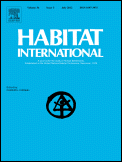
HABITAT INTERNATIONAL
Illuminating pathways to sustainable urban living.HABITAT INTERNATIONAL is a prestigious academic journal published by Pergamon-Elsevier Science Ltd, based in the United Kingdom. With an impressive Q1 ranking in both Nature and Landscape Conservation and Urban Studies, this journal has established itself as a leading platform for the dissemination of high-quality research in the fields of environmental sustainability, human-environment interactions, and urban planning. Having commenced in 1970, it has evolved through several converged periods, demonstrating its long-standing commitment to fostering scholarly discourse and innovation. Researchers and professionals in urban studies, conservation, and related domains will find value in the journal's rigorous peer-reviewed articles, which address critical issues facing habitats and urban environments today. While the journal does not currently offer open access options, its impact factor and SCOPUS rank - Rank #10/279 and 96th percentile in Urban Studies - underline its importance in advancing knowledge and understanding in these dynamic fields.

Journal of Fish and Wildlife Management
Navigating the future of fish and wildlife conservation.The Journal of Fish and Wildlife Management, published by the U.S. Fish & Wildlife Service, serves as a vital resource for scholars, researchers, and professionals in the fields of Animal Science, Ecology, and Conservation Biology. With its ISSN 1944-687X, this esteemed journal has been disseminating critical research findings since 2010, contributing significantly to the understanding of fish and wildlife conservation practices and their ecological impacts. Despite its Q3 category rankings in various disciplines as of 2023, it provides a platform for innovative research that influences policy and management strategies for biodiversity conservation. The journal, although not open access, remains committed to advancing the scientific discourse surrounding wildlife management with articles that emphasize practical conservation efforts and ecological sustainability. Readers can expect a diverse range of articles that promote best practices in the management and conservation of fish and wildlife resources, furthering our collective mission of preserving ecological health and biodiversity for future generations.

Journal of Geovisualization and Spatial Analysis
Illuminating Geographic Science Through Rigorous AnalysisJournal of Geovisualization and Spatial Analysis, published by SpringerNature, is an influential open-access journal specializing in the cutting-edge fields of geovisualization, spatial analysis, and their application in earth sciences and geography. Since its inception in 2017, this journal has established a prominent stance with a high impact factor and prestigious Q1 rankings across multiple categories, including Computers in Earth Sciences, Earth and Planetary Sciences (miscellaneous), and Geography, Planning and Development. The editorial board is committed to advancing innovative research and methodologies, providing a platform for scholars to disseminate their findings globally. With impressive Scopus rankings—placing it in the top percentiles among its peers—the journal serves as a vital resource for researchers, professionals, and students keen on understanding spatial data and its implications for geographic science. Its emphasis on rigorous peer review and rapid publication enhances accessibility to substantive research, thus fostering knowledge sharing within the scientific community. Based in Switzerland, the journal promotes a collaborative environment for interdisciplinary studies, making it an essential read for anyone involved in spatial analysis research.
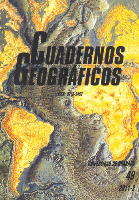
Cuadernos Geograficos
Championing open access for impactful geographical research.Cuadernos Geograficos is a distinguished open access journal published by UNIV GRANADA in Spain, dedicated to advancing the fields of geography, planning, and earth-surface processes. With an ISSN of 0210-5462 and E-ISSN 2340-0129, this journal has been serving as an essential platform for scholars since its inception in 1983. By providing rigorous peer-reviewed research, Cuadernos Geograficos contributes significantly to the academic discourse within these disciplines, holding a respectable position in the Q3 category for both Earth-Surface Processes and Geography, Planning, and Development as of 2023. The journal is indexed in Scopus, ranking #431/821 in Social Sciences and #100/179 in Earth and Planetary Sciences, affirming its relevance and impact within the scholarly community. With its commitment to open access since 1999, Cuadernos Geograficos ensures that vital research is accessible to a diverse audience of researchers, professionals, and students, fostering knowledge sharing and collaborative advancements in the geographical sciences.